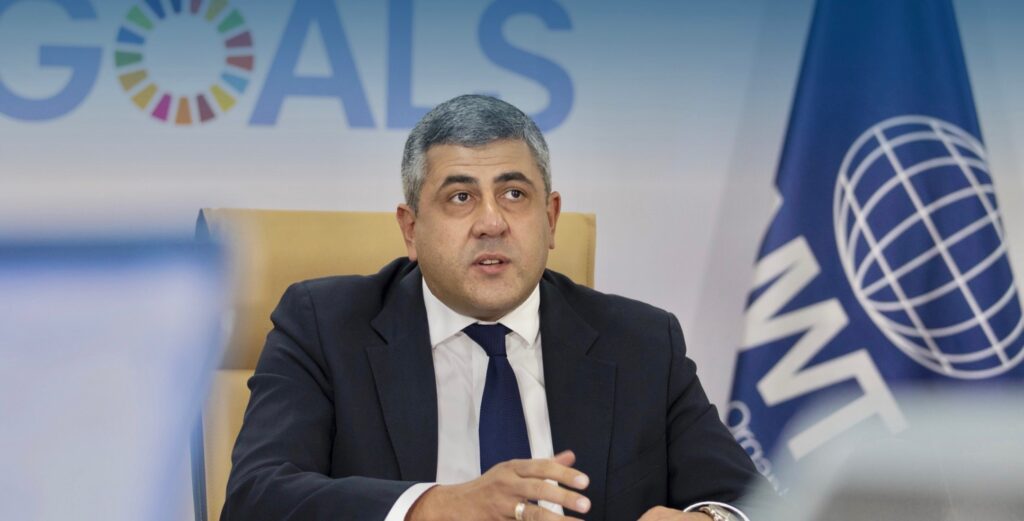G20 TOURISM LEADERS INTENSIFY EFFORTS TOWARDS A SUSTAINABLE RECOVERY
Tourism Ministers of the G20 nations have committed to stepping up their efforts to place sustainability and inclusion at the heart of tourism recovery and future growth.
The private sector event was opened by HE Ahmed Al Khateeb, Saudi Arabia’s Minister of Tourism and Chair of the G20 Tourism Track (pictured above), followed by a speech by WTTC President & CEO, Gloria Guevara.
Chris Nassetta, President & CEO of Hilton and WTTC Chair, along with CEOs and Ministers representing all regions of the world, including Argentina, UK, UAE, Singapore and Spain, formed a unified voice agreeing that through joint collaboration, the recovery of Travel & Tourism can be accelerated.
The CEOs used the historic forum to outline what they believe could be a game changing new 24-point plan that would save the struggling sector.
Gloria Guevara, WTTC President & CEO, said: “This historic meeting provided the best platform to establish public and private collaboration which will lead to rebuilding a sector which has been devastated by the pandemic.
“On behalf of WTTC and the private sector globally, I would like to thank and recognise the Minister of Tourism of Saudi Arabia for his leadership, as well as the G20 Tourism Ministers for their collaboration to recover millions of jobs and livelihoods through the resumption of international travel in a safe and effective way.
Alexandre de Juniac, Director General, IATA, and Fang Liu, Secretary General, ICAO, added their voice to testing being the solution to eliminate quarantines.
According to Alexandre de Juniac, “It is critical that governments and industry work together to safely re-open borders with systematic COVID-19 testing. Some 46 million jobs are at risk. The historic participation of industry in this G20 Summit is a good start to the government-industry partnership that will be needed to revive the travel and tourism economy on which 10% of global GDP depends.”
Alex Cruz, Chairman and Chief Executive of British Airways added: “Be in no doubt; Covid-19 has led to the worst crisis in the history of commercial global aviation. To ensure the industry’s survival we are calling for a common global approach to testing and the creation of regional air corridors so that we can get more flights back in the air, and the global economy moving, as soon as possible. Governments must act fast and work together before it’s too late.”
Arnold Donald, President & CEO of Carnival Corporation and North American Vice-Chair said, “It was an honour to have the opportunity to speak at this important event. The travel and tourism sector has been a major driver in global economic growth over the last 5 years and it is imperative that we all work together to restart international travel in a safe and efficient manner.”
The implementation of the World Tourism Organization AlUla Framework for Inclusive Community Development Through Tourism, presented on the occasion of the Ministerial Meeting, was welcomed by the G20 Tourism Ministers as a tool for achieving a fairer and more inclusive sector.
Under the leadership of the 2020 G20 Saudi Presidency, UNWTO and the G20 Tourism Working Group developed the AlUla Framework to further advance the contribution of the sector as an effective means towards fairer growth and advancing the Sustainable Development Goals (SDGs). The Framework provides specific recommendations and tools to support both governments as well as all other key stakeholders in the tourism sector – including regional and local governments, the private sector, industry associations, civil society, communities and tourists – fostering a truly holistic and integrated approach to inclusive community development through tourism.
His Excellency Ahmed Al Khateeb, Saudi Arabia’s Minister for Tourism and Chair of the G20 Tourism Ministers’ Meeting welcomed the new UNWTO AlUla Framework saying, “On behalf of the G20 Tourism Ministers, I commend the Tourism Working Group and the UNWTO for this initiative. The AlUla Framework – named after Saudi Arabia’s first UNESCO world heritage site – demonstrates how the tourism sector can promote inclusive community development by highlighting practical examples and case studies that governments can emulate to protect local culture and the environment, while empowering local communities, especially women and young people. The Framework is a vital tool to be used as we work together to rebuild the tourism sector to be more sustainable, resilient and inclusive.

UNWTO Secretary-General Zurab Pololikashvili said: “As we join forces to restart tourism, we must live up to our responsibility to ensure that tourism’s benefits are shared by all. I congratulate the Saudi Presidency for placing inclusive community development through tourism at the heart of the G20 Agenda and I invite G20 countries to follow this vision and embrace tourism as an effective means for inclusion and sustainability.”
Calling for a model of tourism development based on Public-Private-Community (PPC) partnerships, the Framework includes a set of concrete programmes and initiatives based around four pillars of action – empowerment, safeguarding, prosperity and collaboration. It further defines the key areas of measurement for the impact of tourism in the communities in line with the Measuring Sustainable Tourism Initiative, led by UNWTO.
Among the G20 Guidelines for Inclusive Community Development through Tourism endorsed at the meeting, is the importance of placing tourism at the heart of development policies at international, national and local level. The Guidelines further stress the importance of human capital development, inclusive labor markets, adequate social protection, and innovation and entrepreneurship as key contributors to travel and tourism as a human-centred sector, as well as to advancing women’s empowerment and to create decent jobs for all.
